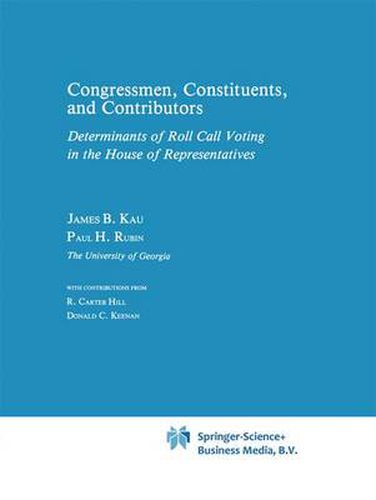Readings Newsletter
Become a Readings Member to make your shopping experience even easier.
Sign in or sign up for free!
You’re not far away from qualifying for FREE standard shipping within Australia
You’ve qualified for FREE standard shipping within Australia
The cart is loading…






This title is printed to order. This book may have been self-published. If so, we cannot guarantee the quality of the content. In the main most books will have gone through the editing process however some may not. We therefore suggest that you be aware of this before ordering this book. If in doubt check either the author or publisher’s details as we are unable to accept any returns unless they are faulty. Please contact us if you have any questions.
In a sense, this book might seem like a strange undertaking for two economists. The material seems to be much closer to political science than to economics; our topic is the determinants of congressional voting. Legislatures and roll call voting are traditionally in the domain of political science. This introduction is intended to explain why we have found this book worth writing. Today the economy functions in a regulated framework. Whether or not there ever was a golden age of laissez faire capitalism is an issue for historians; such an age does not now exist. One implication of the high degree of politicization of the modern economy is that one cannot any longer study economics divorced from politics. The rise to prominence of the field of public choice is one strong piece of evidence about what many economists see as the significant influence of the political sector over what would seem to be purely economic variables. A more homey example may also be used to il lustrate the phenomenon of increased politicization of the economy. All economists have had the experience of lecturing on the unemployment creating effects of a minimum wage or on the shortage-creating implications of price controls, only to have a student ask: But if that is so, why do we have those laws? One way of viewing this book is as an attempt to answer that question.
$9.00 standard shipping within Australia
FREE standard shipping within Australia for orders over $100.00
Express & International shipping calculated at checkout
This title is printed to order. This book may have been self-published. If so, we cannot guarantee the quality of the content. In the main most books will have gone through the editing process however some may not. We therefore suggest that you be aware of this before ordering this book. If in doubt check either the author or publisher’s details as we are unable to accept any returns unless they are faulty. Please contact us if you have any questions.
In a sense, this book might seem like a strange undertaking for two economists. The material seems to be much closer to political science than to economics; our topic is the determinants of congressional voting. Legislatures and roll call voting are traditionally in the domain of political science. This introduction is intended to explain why we have found this book worth writing. Today the economy functions in a regulated framework. Whether or not there ever was a golden age of laissez faire capitalism is an issue for historians; such an age does not now exist. One implication of the high degree of politicization of the modern economy is that one cannot any longer study economics divorced from politics. The rise to prominence of the field of public choice is one strong piece of evidence about what many economists see as the significant influence of the political sector over what would seem to be purely economic variables. A more homey example may also be used to il lustrate the phenomenon of increased politicization of the economy. All economists have had the experience of lecturing on the unemployment creating effects of a minimum wage or on the shortage-creating implications of price controls, only to have a student ask: But if that is so, why do we have those laws? One way of viewing this book is as an attempt to answer that question.